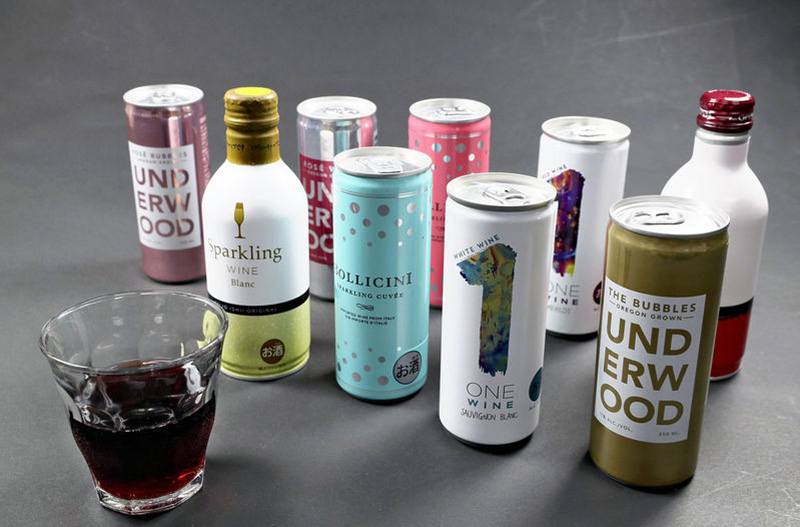
Canned wine products
15:45 JST, January 19, 2022
OSAKA — Canned wine has recently been enjoying a boost in popularity amid the coronavirus crisis. Its single-helping size and easy portability make it a perfect fit for not just home drinking but for outdoor activities as well.
“Canned wine boasts a stylish design and a great taste. Whenever I take some as a souvenir for others, [the wine’s] uniqueness gets the party started,” said Satoshi Koga, the operator of an IT-related firm in Fukuoka. While talking about what draws people to canned wine, Koga said he has brought some with him on mountain climbing trips and has even enjoyed it as hot wine.
A can of wine contains about 250 milliliters, about one-third the volume of a standard bottle, which can be easily enjoyed alone or with a friend. This is part of what makes it suitable for home drinking during the COVID-19 pandemic.
Canned wine is also lighter than bottled, can be chilled easily and requires no special equipment to open it.
“Canned wine has been booming in the United States in recent years, particularly among the young. So, we started importing [Underwood] as a trial,” said an official of Kobe International Inc., which has been importing and selling Underwood canned wine from Oregon since 2019.
Although the price of a 250-milliliter can — ¥990 — may be a bit pricey, sales are steadily increasing. According to the firm, the product is widely sold at department stores, supermarkets and take-out restaurants.
“Because a bottle of [Underwood] wine costs like ¥3,000, canned wine is an easier purchase. I think a lot of people buy it as a small luxury item,” said a person in charge.
Rolling out new products
Canned wine has been sold on trains across the nation for more than 10 years. To meet growing demand, Seijo Ishii Co. began selling 290-milliliter cans of its original sparkling wine at ¥439 in 2019.
“It’s become a regular item and we have many repeat customers,” a company spokesperson said.
Domestic manufacturers are also promoting canned wine through the introduction of new products. Suntory Wine International Ltd. debuted 250-milliliter cans of One Wine in October, filling cans bearing sophisticated designs with wines from a prestigious French winery.
Foreseeing demand among the younger generation, the company is selling a number of products on its website, including sets of four different wines priced at ¥2,200.
The firm also launched new canned wine products in February and March last year. “We hope that people who want wine but don’t typically buy it on a daily basis would be open to pick up [some of our wine],” a representative said.
“Many people were uncomfortable with canned wine, but the image has been changing as more such wines are being produced with a focus on quality,” Yukako Komatsu, editor-in-chief of a wine magazine Winart, said. “I believe more people, from wine newcomers to enthusiasts, will enjoy both bottled and canned wine for different occasions.”
Aluminum: A recycler’s dream
Canned wine’s growing popularity is based not only on its convenience and style. Metallic cans have been reevaluated as eco-friendly containers with a low environmental impact because of their high recycling rate.
According to the Aluminum Can Recycling Association, 94% of aluminum cans were recycled in fiscal 2020. Meanwhile, 86% of plastic bottles were recycled in fiscal 2019, according to the Council for PET Bottle Recycling, and 69% of glass bottles were recycled in fiscal 2020, according to the Glass Bottle 3R Promotion Association.
Another aspect drawing attention as of late is the can-to-can “horizontal recycling rate,” the rate at which aluminum cans are made from collected aluminum cans. Overall, 71% of aluminum cans underwent this process, much higher than the 13% of plastic beverage bottles.
Ryohin Keikaku Co., the operating company behind Mujirushi Ryohin and Muji, considers aluminum cans with a high horizontal recycling rate to be a circular resource, capable of being infinitely recycled. As such, the firm has been gradually switching its beverage containers from plastic bottles to aluminum cans.
DyDo Drinco Inc. is also expanding its range of canned products to tea, water and sports drinks in response to companies that employ the firm’s vending machines wanting to reduce their plastic waste.
Top Articles in Business
-

Prudential Life Insurance Plans to Fully Compensate for Damages Caused by Fraudulent Actions Without Waiting for Third-Party Committee Review
-

Narita Airport, Startup in Japan Demonstrate Machine to Compress Clothes for Tourists to Prevent People from Abandoning Suitcases
-

Japan, U.S. Name 3 Inaugural Investment Projects; Reached Agreement After Considerable Difficulty
-

Toyota Motor Group Firm to Sell Clean Energy Greenhouses for Strawberries
-

SoftBank Launches AI Service for Call Centers That Converts Harsh Customer Voices into Softer Voices
JN ACCESS RANKING
-

Japan PM Takaichi’s Cabinet Resigns en Masse
-

Japan Institute to Use Domestic Commercial Optical Lattice Clock to Set Japan Standard Time
-

Israeli Ambassador to Japan Speaks about Japan’s Role in the Reconstruction of Gaza
-

Man Infected with Measles Reportedly Dined at Restaurant in Tokyo Station
-

Videos Plagiarized, Reposted with False Subtitles Claiming ‘Ryukyu Belongs to China’; Anti-China False Information Also Posted in Japan






















